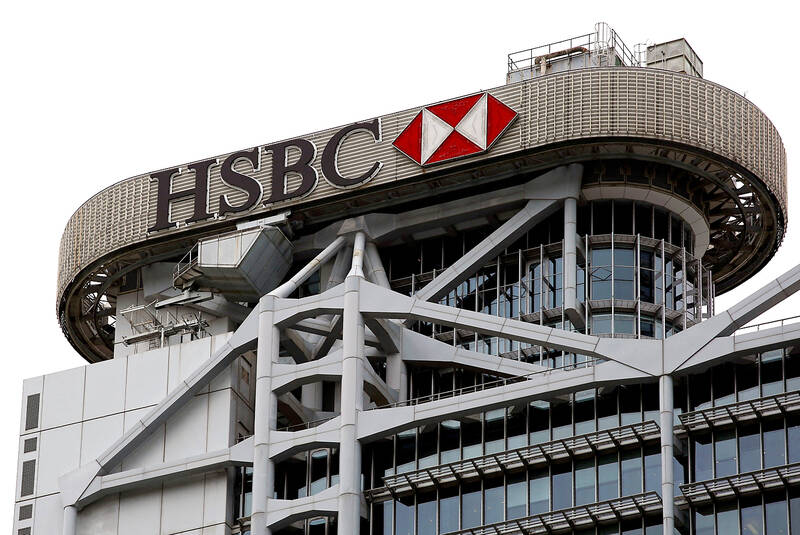Two exiled pro-democracy Hong Kong activists have been blocked from accessing their pensions, depriving them of tens of thousands of US dollars of their savings and raising questions about the complicity of western financial institutions in the persecution of Chinese government critics.
Assets, including pension savings, belonging to Ted Hui (許智?), a former pro-democracy legislator who is now based in Australia, were frozen shortly after he fled from Hong Kong in December 2020. The assets are held by HSBC, a British bank.
HSBC briefly unfroze Hui’s accounts in December 2020, during which time he was able to transfer “the majority of funds” out of Hong Kong, Hui said. But he recently said that his pension, worth several hundred thousand Hong Kong dollars, remains locked in his HSBC-administered pension scheme.

Photo: Reuters
The Guardian has learned that another high-profile pro-democracy figure, who has Australian permanent residence, has also been blocked from withdrawing his pension savings, worth more than HK$600,000 (US$76,900). The savings are managed by Manulife, a Canadian financial services firm.
Hui and the other activist, who does not wish to be named, have been issued with arrest warrants by the Hong Kong police for allegedly violating the city’s national security law while in exile. HK$1 million has been offered for information leading to their arrest.
In 2022, Hui was convicted in absentia for his role in the 2019 protests and sentenced to three-and-a-half years in jail.
In November, the second activist attempted to withdraw his pension from the fund administered by Manulife, one of the financial institutions approved to manage Hong Kong’s compulsory pensions scheme. He was notified in March that the claim could not be processed because his account was under investigation.
The exiled activist said Manulife’s decision was “hypocritical.”
“These companies like Manulife sign up to human rights pledges, but they don’t honor those pledges,” he said.
Manulife’s anti-slavery statement states that it is committed to “the protection of internationally proclaimed human rights.”
“The only reason to deny me is because of the national security law,” said the activist, who has no other legal charges against him.
A Manulife spokesperson said: “We do not comment on individual cases. Manulife complies with all laws and regulations in the jurisdictions we operate in.”
Hong Kong’s national security law, imposed in 2020 after months of pro-democracy protests, has been widely condemned by international governments and human rights organizations for suppressing free expression in Hong Kong. Tens of thousands of Hongkongers have left the city since it was imposed amid a wider crackdown on civil society. The Chinese and Hong Kong governments said the law was necessary to restore stability.
Hongkongers are entitled to withdraw their pensions early if they have permanently resettled outside Hong Kong. They must provide proof that they are permitted to reside overseas, such as permanent residence documents or a foreign passport.
In January 2021, in response to the national security law, the UK government launched a special visa scheme to Hongkongers in possession of a British national (overseas) (BNO) passport, allowing them to resettle in the UK. As of March, nearly 150,000 people have arrived in the UK via that route, according to Home Office statistics.
But Hong Kong and the pensions regulator, the Mandatory Provident Fund Authority (MPFA), have said that they do not recognize BNO passports as a valid travel document or as proof of permanent resettlement. That means many Hongkongers in the UK have been blocked from accessing savings, typically worth tens of thousands of US dollars per person.
Last year, there were 29,900 claims to withdraw pensions savings early on the grounds of permanent departure from Hong Kong, according to the MPFA, down from 31,700 in 2022.
The national security law allows the authorities to freeze the assets of anyone charged with violating national security. But critics say that the law, and the way in which it is used, is politically motivated.
Megan Khoo, a research and policy adviser at Hong Kong Watch, a pressure group, said: “Every week I receive rejection letters from Hongkongers on the British national (overseas) visa scheme … who continue to be blocked from accessing their hard-earned retirement savings. These two cases are particularly important, as they demonstrate that the freezing of Hongkongers’ assets is not just a BNO issue … but one of transnational repression.”
Hui said that the impact of being denied access to his savings was emotional as well as practical.
“It is a warning sign, targeting many of the high profile people advocating for freedom and democracy in Hong Kong,” he said.
A HSBC spokesperson said: “We are unable to comment on individual matters. We have to abide by the laws and regulations of the

A few years ago, getting a visa to visit China was a “ball ache,” says Kate Murray. The Australian was going for a four-day trade show, but the visa required a formal invitation from the organizers and what felt like “a thousand forms.” “They wanted so many details about your life and personal life,” she tells the Guardian. “The paperwork was bonkers.” But were she to go back again now, Murray could just jump on the plane. Australians are among citizens of almost 40 countries for which China now waives visas for business, tourism or family visits for up to four weeks. It’s

Climate change, political headwinds and diverging market dynamics around the world have pushed coffee prices to fresh records, jacking up the cost of your everyday brew or a barista’s signature macchiato. While the current hot streak may calm down in the coming months, experts and industry insiders expect volatility will remain the watchword, giving little visibility for producers — two-thirds of whom farm parcels of less than one hectare. METEORIC RISE The price of arabica beans listed in New York surged by 90 percent last year, smashing on Dec. 10 a record dating from 1977 — US$3.48 per pound. Robusta prices have